#sir robert peel
Text
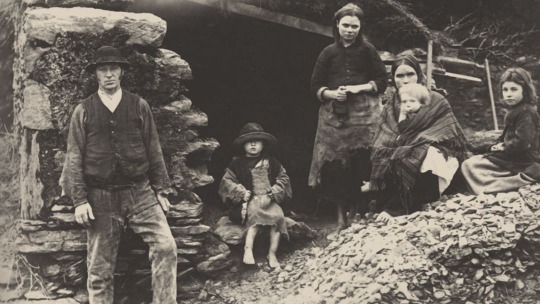
It's that time of year when you are going to see some "Irish" t-shirts in stores and can get your Shamrock Shake at Mickey D's. There will be St. Patrick's Day parades this weekend and next.
And I just want to be a nerdy know-it-all for a second. St Patrick's Day was originally a religious holiday (as most holidays were, holy + day = holiday); it still is in some places, like some actual Irish people from Ireland who believe in God--though the American parade/festival mentality seems to be gaining steam in some parts of Ireland, I am told.
St Patrick's Day as we know it is deeply rooted in the United States. Though it's been celebrated here since 1600 in the territory that became Florida, the tenor of the holiday greatly changed after the Great Famine of Ireland.
You may have been told in school that the famine occurred because a blight wiped out potato crops in Ireland. This is true but doesn't address the crux of the matter.
The blight started in North America and travelled to Ireland and into much of Europe. But we only think of it as an Irish problem because the Irish were too poor to eat other foods.
Some scholars have said it was a "man made crisis" and I agree that is true. Other crops in Ireland were not affected by the blight, in fact, this time was considered one of "plenty", but all that food was used to feed the English. Not the Irish.
Nor were the English quick on providing aid, "There is such a tendency to exaggeration and inaccuracy in Irish reports that delay in acting on them is always desirable," said Prime Minister Sir Robert Peel after initial reports of the catastrophe.
Workhouses designed to assist the poor and starving were closed prematurely. "The only way to prevent the people from becoming habitually dependent on Government is to bring the food depots to a close," said Charles Trevelyan, the man who was literally in charge of famine relief. He also said some gems like, Sure the famine is bad but "the moral evil of the selfish, perverse and turbulent character of the people" was the real problem. Great guy; he became a Baronet.
The soup kitchens, which replaced the workhouses were also closed prematurely, were widely believed to serve portions too small even for children and lacking any nutritional value due to them being watered down to feed more people than anticipated by the brilliant British government.
A million people died in Ireland from famine and disease and nearly 2 million left Ireland for other parts of the world. Including my father's family. (If they survived the "Coffin Ships" leaving their home.)
So when I said above that the tenor of the holiday changed, it was because of increasing Irish Nationalism and anger at Britain. Now, Ireland is a Republic (though it's not unified, yet) and we are proud of those who stayed and fought to make that happen.
We are also proud just to still be alive anywhere. The population of Ireland is 6.9 million now--slowly nearing the 8.5 million it was home to before the famine--but people with Irish ancestry across the world has been measured to be about 80 million people. Take that, Sir Robert Peel.
The English actively tried to kill us. Nevertheless, we persisted. A lot.
I hope you have a Happy St. Paddy's Day (it's Paddy not Patty). Drink some Guinness. Dance some jigs. Definitely eat some potatoes (Boil 'em! Mash 'em! Stick 'em in a stew!) But please remember that when people are starving, you should feed them. Don't be like the English government.
In fact, as I write this there is a crisis in Turkey and Syria. It just so happens that the Sultan of Turkey wanted to donate money to Ireland (10,000 pounds) but since Queen Victoria donated just 2,000, he was told it would be against protocol.
#st patricks day#saint patrick#ireland#irish american#the great famine#irish potato famine#st paddys day#turkey#turkey earthquake#syria earthquake#immigration#sir robert peel#england#queen victoria#Charles Trevelyan#republic of ireland#nothern ireland
192 notes
·
View notes
Text
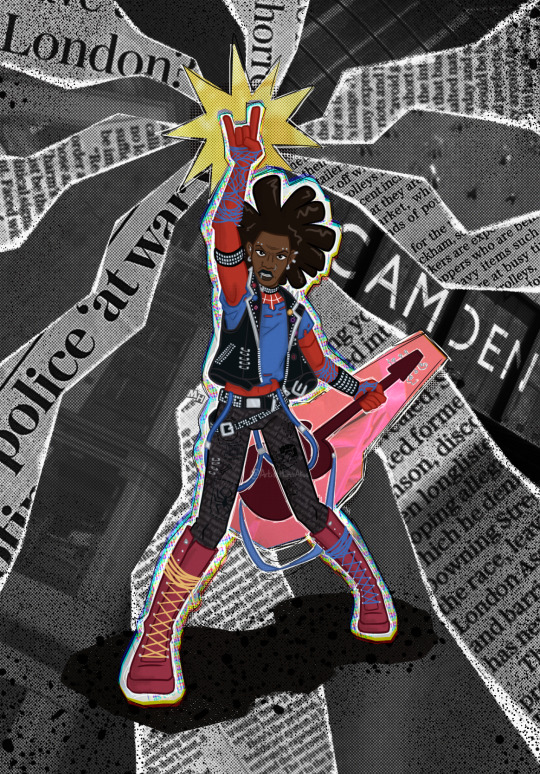
British Police Slang! 🇬🇧
As promised, here is a post all about British police slang! The police are intrinsically tied to Spider-Man’s story, especially for Hobie as an anarchist arachnid, fascist punching, punk rebel fighting against a corrupt government and police force.
So let’s get started!
My main inspiration for compiling this list is because of how often I’ve read the phrase “bottle and stopper” from Hobie in fics. I thought I could help inform writers about the many options that they might not have known about when it comes to British police slang. And since I’ve seen it used so much, I thought this would be a good place to start!
Bottle and stopper - Cockney rhyming slang for copper/a police officer (as mentioned in my Cockney Rhyming Slang post, here). It’s more commonly shortened to “Bottle” or adapted to “Bluebottle” or “Mr Bluebottle” due to the colour of their uniforms. Also, “bluebottle mob” can be used to mean the police force.
To be perfectly honest, I’d never heard an officer referred to as a bottle and stopper before reading Spider-Verse fanfics, though that’s not to say others don’t use it or that it’s not a good or accurate phrase. I’ve just personally heard most of the following terms used more.
Other slang terms for the police:
Sweeney/Sweeney Todd - Cockney rhyming slang for Flying Squad (the police). The Flying Squad is a branch of the Serious and Organised Crime Command within Londons Metropolitan Police Service. They investigate robberies.
E.g. “Here come the Sweeney!”
Bobby - a police officer. Originating from Sir Robert Peel who established the force in 1829.
E.g. “We had bobbies knocking on our door this morning looking for you.”
Peeler - a police officer. Also originating from Sir Robert Peel.
E.g “Watch out for the peelers.”
Copper - a police officer. Originating from the word “cop” which meant “to capture”, so a copper is someone who captures. I know “cop” is used commonly in America too but I still thought it was worth noting the use of “copper” in the UK.
E.g. “Alright, copper?”
The Bill/The Old Bill- the police. This became a nickname for the Met police after the Great War when it was fashionable to wear one’s moustache like the cartoon soldier character Old Bill, by George Bairnsfather.
E.g. “They won’t talk to the Old Bill but they might talk to you.”
Filth - derogatory slang for the police.
E.g. “Watch out, the filth are behind us.”
Dibble - derogatory slang for a police officer, originating from the character Officer Dibble from the cartoon Top Cat.
E.g. “Good afternoon, Dibble!”
Fuzz - the police. I believe it comes from a mispronunciation of “the force”. Most commonly known from the movie Hot Fuzz.
E.g. “Look, there’s the fuzz!”
Plod/PC Plod - a police officer. Originates from Mr Plod, a police character in books by children’s author Enid Blyton.
E.g. “I was enjoying my day, then PC Plod over here had to go and ruin it!”
Pig - derogatory term for a police officer or informer. It’s a bit unclear about the origins of this word being used to mean police, but some people believe it’s an allusion to early detectives sniffing out crime like pigs with truffles. It could also just be something insulting to call them or perhaps relates to another police slang term, “filth”?
E.g. “There’s pigs crawling all over London.”
Slang words relating to the police or to crime:
Booked/nicked - to be arrested/to get in trouble.
E.g. “They got nicked last night.”
Nick - police station or prison. Also means to steal something.
E.g. “Alex nicked a packet of Monster Much and a bottle of vodka, got nicked and now they’ve spent a night in the nick.”
Grass - a police informer/to tell the police/narc. Originates from the rhyming slang “grasshopper” meaning “copper”. The “grass” or “grasser” tells the “copper”.
E.g. “You grassed me up!” Or “He’s a grass!” Or “Don’t be a grass.”
Dob in - to tell someone about something someone else has done wrong.
E.g. “You dobbed me in to the police!”
Porridge - a prison sentence. Originates from the 1950’s when porridge was a large part of a prisoners diet in Britain.
E.g. “Just do your porridge and keep your head down.” Or “She’s serving porridge.”
And there you go, a selection of British police slang! By no means am I saying that these words are only said in the UK, but these are either very common here or have historical origins in the UK. As mentioned in my Cockney post, I’m not an expert on the subject and I can only speak from one perspective of British culture (white British); there are many cultures and social groups here that may have other slang terms that I either have forgotten about or have never heard of. I’m just sharing the knowledge that I have in the hopes that it will helpful, informative, or at the very least entertaining to someone. And hopefully it’ll help give all you Hobie fanfic writers a new choice of slang vocabulary to pick and choose from!
I might make another post about general British slang words. Let me know if that’s something you’d be interested in or if there’s a specific area that you’d like to know about!
#hobie brown#atsv hobie#hobie brown atsv#hobie brown fanart#atsv fanart#hobie spiderverse#across the spider verse fanart#hobie fanart#fic help#British slang#across the spiderverse#spiderman across the spiderverse#spiderman#spider man: across the spider verse#atsv fic#hobie brown fanfiction#atsv fanfiction#across the spider verse fanfic#spiderverse fanfic#spider verse fanfic#click for better image quality#spider punk
359 notes
·
View notes
Text
On this day, 189 years ago: 16-year-old Emily Brontë and 14-year-old Anne Brontë write a diary entry:


November the 24
1834 Monday
Emily Jane Brontë
Anne Brontë
I fed Rainbow, Diamond Snowflake Jasper pheasant this morning. Branwell went down to Mr. Driver's and brought news that Sir Robert Peel was going to be invited to stand for Leeds. Anne and I have been peeling apples for Charlotte to make us an apple pudding and for Aunt nuts and apples. Charlotte said she made puddings perfectly and she was of a quick but limited intellect. Taby said just now Come Anne pilloputate (i.e. pill a potato). Aunt has come into the kitchen just now and said where are your feet Anne? Anne answered On the floor Aunt. papa opened the parlour door and gave Branwell a letter saying here Branwell read this and show it to your Aunt and Charlotte – The Gondals are discovering the interior of Gaaldine, Sally Mosley is washing in the back kitchen.
It is past Twelve o'clock. Anne and I have not tidied ourselves, done our bedwork or done our lessons and we want to go out to play. We are going to have for Dinner Boiled Beef, Turnips, potatoes and applepudding. The Kitchin is in a very untidy state. Anne and I have not done our music exercise which consists of b major. Taby said on my putting a pen in her face Ya pitter pottering there instead of pilling a potate. I answered O Dear, O Dear, O dear I will directly. With that I get up, take a knife and begin pilling (finished) pilling the potatoes. Papa going to walk. Mr. Sunderland expected.
Anne and I say I wonder what we shall be like and what we shall be and where we shall be if all goes on well in the year 1874 – in which year I shall be in my 54th year Anne will be going in her 55th year Branwell will be going in his 58th year And Charlotte in her 59th year hoping we shall all be well at that time we close our paper
Emily and Anne
November the 24 1834
#THE END??!?! kill me#none of them saw 1874#emily got her age wrong?#some editions contain all the original spelling/grammar errors#the bronte sisters#the bronte family#the brontes#anne bronte#emily bronte#cute#literature#english literature#letters#1800s#19th century#victoriana#victorian#thanksgiving#the brontë sisters#anne brontë#emily brontë#autumn#winter#cozy#cottagecore#dark academia
84 notes
·
View notes
Text
Grand Geode, 1883. Lieutenant Roberts sees a familiar face. Or at least something wearing that face.
There’s a storm coming. Heat and humidity hang in the air, adding strain to each breath. Sweat pools at the back of Roberts’ neck, the droplets sliding down the curve of his spine beneath his uniform. He does his best to ignore the discomfort, gripping the folder in his hands yet tighter as he follows a familiar set of turns down the hall to the Commodore’s office.
In a previous life, he may have regarded his current position as gruntwork–dull, administrative minutia, a world away from any action on the Zee, but in moments like these he finds he doesn’t mind. Any moment now, the heat will break, and the Zee will roil under a torrent of foetid-smelling rain, befouled by the Wax Wind. He does not envy the men on their ships when the storm inevitably hits. Carrying documents up the chain is fine by him, if it means stable stone under his dry feet, and a bed that does not sway with the tides.
He turns the corner, and before his hand can even touch the office door, Roberts feels the sudden charge in the air, white-hot and electric, and the hairs on his arms stand on end. The sensation calls back to something familiar, half-forgotten in the back of his mind. He wonders if he should leave, perhaps come back later. But before he has time to properly question it, the Commodore’s voice rings out through the door, as if able to sense his presence through the thick wood.
“Who’s there?”
“It’s Lieutenant Roberts, sir,” he says.
The Commodore is silent for a beat, then answers softly, as if forgetting the heavy door between them.
“Elias, why don’t you come in.”
It’s not framed as a question. And so he does.
The Commodore sits at his desk, in the exact position where Roberts has seen him hundreds of times before. But this time is different. This time, he has a visitor. Radiant. That’s the only way he can think of to describe her. A singular point in the centre of the room, the axis around which so many golden threads warp and turn. She does not look happy to see them. In fact, she doesn’t look much of anything, and he struggles to make out her features through the brilliant haze she emanates.
“Elias, you remember June, don’t you?” There’s a placidness to the Commodore’s voice that he so rarely hears. The man has not taken his eyes off of June since Roberts had entered the room, and he can hardly do so himself.
Indeed he remembers her. If he squints into that light he can even make out her features, unchanged from when he’d last seen her, nearly two decades prior. He feels warm. Not the muggy heat smothering Zelo’s Town, but a glow, spreading from within his chest out into his limbs.
“Of course,” he says. How could he forget?
June does not greet him. She does not take her eyes off of the serene face of the Commodore. When her mouth opens, the sound that comes out is otherworldly, timbres not possible on human vocal chords. The sound reverberates through Roberts’ body, like the bass tones of chugging machinery.
It was something of importance. He’s sure of it. She wouldn’t be here, speaking to him, to them, to the Commodore, were it not. A Zee captain will return, and when they do, the Admiralty will be ready. She leaves her instructions. Her voice is so warm, all-encompassing, a rumbling static beating a tune against his eardrums. He will complete the Work. Whatever it is she needs, he will do. They will do.
He tells her this. At least, he thinks he does. Whether or not he speaks the words out loud she must know this of him. Her eyes are on the Commodore, whose head nods in a slow daze. Of course they can manage. He’ll personally ensure they have the supplies they need. More heat. Pride, this time, that they can do what she requests of them.
And then she turns to him, golden eyes boring directly through him, setting him alight. Her lips open to speak and–
He comes to at a raucous peel of thunder. June is long gone, and he shivers at the unexpected cold left by her absence, despite the muggy air. Yet despite the chill of her absence, he feels… calm. A slow satisfaction at having done… something right. At least, he feels so. Something worthwhile.
It’s only several minutes later, when he stands under the building’s awning, the rhythm of rain pounding a frenetic drumbeat into the steel roof, that he realises he’s still clutching the missive meant for the Commodore.
#roberts/nite#this was going to have a very different tone#but burning and yearning muddles us all#running with my 'the dawn machine has consumed june and she's become its mouthpiece' headcanon#though the more time i spend here the more i feel like she's been vaporised to kickstart the thing#but maybe something with her shape still walks its rings#and on very special occasions makes its way across the zee to make its thoughts known#i feel so naked sharing writing on here#this is not my world#what a weird feeling#right here goes nothing
21 notes
·
View notes
Text
THIS DAY IN GAY HISTORY
based on: The White Crane Institute's 'Gay Wisdom', Gay Birthdays, Gay For Today, Famous GLBT, glbt-Gay Encylopedia, Today in Gay History, Wikipedia, and more … December 21

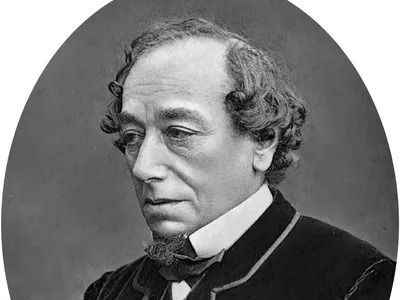
1804 – Benjamin Disraeli (d.1881) was a British Conservative politician, writer and aristocrat who twice served as Prime Minister. He played a central role in the creation of the modern Conservative Party, defining its policies and its broad outreach. Disraeli is remembered for his influential voice in world affairs, his political battles with the Liberal leader William Gladstone, and his one nation conservatism or "Tory democracy". He made the Conservatives the party most identified with the glory and power of the British Empire. He is, as of 2015, the only British Prime Minister of Jewish birth. Disraeli was born in London. His father left Judaism after a dispute at his synagogue; young Benjamin became an Anglican at age 12.
Together with his sister's fiancé, William Meredith, Disraeli travelled widely in southern Europe and beyond in 1830–31. The trip was financed partly by a novel, The Young Duke, written by Disraeli in 1829–30. The tour was cut short suddenly by Meredith's death from smallpox in Cairo in July 1831. Despite this tragedy, and the need for treatment for a sexually transmitted disease on his return, Disraeli felt enriched by his experiences. He became aware of values that seemed denied to his insular countrymen. The journey encouraged his self-consciousness, his moral relativism, and his interest in Eastern racial and religious attitudes.
After several unsuccessful attempts in which his opposition accused Disraeli of practicing "Eastern love", i.e. homosexuality, Disraeli entered the House of Commons in 1837. When the Conservatives gained power in 1841, Disraeli was given no office by the Prime Minister, Sir Robert Peel. In 1846, Peel split the party over his proposal to repeal the Corn Laws, which imposed a tariff on imported grain. Disraeli clashed with Peel in the Commons. The Conservatives who split from Peel had few who were adept in Parliament, and Disraeli became a major figure in the party, though many in it did not favor him. When Lord Derby, the party leader, thrice formed governments in the 1850s and 1860s, Disraeli served as Chancellor of the Exchequer and Leader of the House of Commons. He also forged a bitter rivalry with the Liberal Party’s William Gladstone.
Upon Derby's retirement in 1868, Disraeli became Prime Minister briefly before losing that year's election. He returned to opposition, before leading the party to a majority in the 1874 election. He maintained a close friendship with Queen Victoria, who in 1876 created him Earl of Beaconsfield. Disraeli's second term was dominated by the Eastern Question—the slow decay of the Ottoman Empire and the desire of other European powers, such as Russia, to gain at its expense. Disraeli arranged for the British to purchase a major interest in the Suez Canal Company (in Ottoman-controlled Egypt). In 1878, faced with Russian victories against the Ottomans, he worked at the Congress of Berlin to obtain peace in the Balkans at terms favourable to Britain and unfavourable to Russia, its longstanding enemy. This diplomatic victory over Russia established Disraeli as one of Europe's leading statesmen.
World events thereafter moved against the Conservatives. Controversial wars in Afghanistan and South Africa undermined his public support. He angered British farmers by refusing to reinstitute the Corn Laws in response to poor harvests and cheap imported grain. With Gladstone conducting a massive speaking campaign, his Liberals bested Disraeli's Conservatives in the 1880 election. In his final months, Disraeli led the Conservatives in opposition. He had throughout his career written novels, beginning in 1826, and he published his last completed novel, Endymion, shortly before he died at the age of 76.

1917 – In Russia, the Bolsheviks nullified many laws including the one making sex between men a criminal act. Seventeen years later Article 121 would re-criminalize it, carrying a sentence up to five years "deprivation of freedom."


1944 – Michael Tilson Thomas, the American conductor, was born today. A conductor, pianist, composer and director of the San Francisco Symphony, Thomas has become in a relatively short time one of the most prominent American conductors of his generation. Perhaps most significantly, he is the first Gay conductor to achieve such prominence without masking or hiding his sexuality.
Tilson Thomas does not discuss his sexuality or his personal life with the public, but his dedication to creating and presenting music that explores the Gay experience confirms his importance as a Gay conductor.
Not only has he impressed audiences with his musical vision, talented conducting, and prolific number of recordings, but he has also used his position to commission works by Gay composers that use the medium of classical music to represent Gay life and Gay history.
To this end, he organized the American Mavericks music festival in San Francisco in June 2000. The festival highlighted the works of such composers as Lou Harrison, Lukas Foss, Earle Brown, Steve Reich, David Del Tredici, and Meredith Monk. Tilson Thomas has similarly pushed audiences to rethink the relationship between classical music and homosexuality by celebrating openly Gay composers such as Harrison and by commissioning works from Del Tredici and others that explicitly explore the experiences of Gay men and Lesbians. Although Gay men and Lesbians have long been present in the world of classical music, both as performers and as audience members, they have often remained invisible. Tilson Thomas has taken bold steps to change this.
In May 2001, Tilson Thomas conducted the premiere of Del Tredici's Gay Life, a series of pieces he commissioned that are based on poems by Allen Ginsberg, Thom Gunn, and Paul Monette. The work both explores the experiences of Gay men in America and also delves into the challenges that Gay men have faced in their struggle to survive the AIDS epidemic.
In addition, two of Tilson Thomas' own compositions have added to the small but growing classical music repertoire focused on Gay subjects. Three Poems by Walt Whitman, written for baritone and orchestra, and We Two Boys Together Clinging, for baritone and pian
o, use Whitman's poetry to explore intimacy between men.


1947 – Dr. Steven Watson, born on this date, is a cultural historian who is particularly interested in the dynamics of the twentieth century American avant-garde.
His 1991 book Strange Bedfellows: The First American Avant-Garde was called "a chapter in our national biography" by Stefan Kanfer for the Los Angeles Times and "a marvelous group portrait of a band of cultural renegades" by Publishers Weekly. Watson has written five books about 20th century American avant-garde and counterculture movements, curated two exhibitions at the National Portrait Gallery ("Group Portrait, The First American Avant-Garde" and "Rebels: Painters and Poets of the 1950's"), and served as consultant curator for the Whitney Museum exhibition "Beat Culture and the New America".
Watson grew up in the suburbs of Minneapolis, Minnesota and graduated from Mound High School. He majored in English at Stanford University and participated in anti-Vietnam War protests, including a guerrilla theater piece called Alice in ROTC-Land, co-starring with Sigourney Weaver.
After graduation, he founded an alternative elementary school called KNOW School in Auburn, California. He studied psychology at the University of California, Santa Barbara, where he received his Ph.D. in 1976, and he worked for nineteen years as the staff psychologist of the Putnam County Community Mental Health Clinic.
In 1976, Watson also began writing articles for the Village Voice, New York Newsday, Soho Weekly News, and Gaysweek. His work on gay culture included the first major article about Marsha P. Johnson, an early extended interview with Sylvia Rivera, and a book about the transgender figure, Minette. At the same time, he began writing books about key circles of the twentieth century.
He currently lives in New York City.

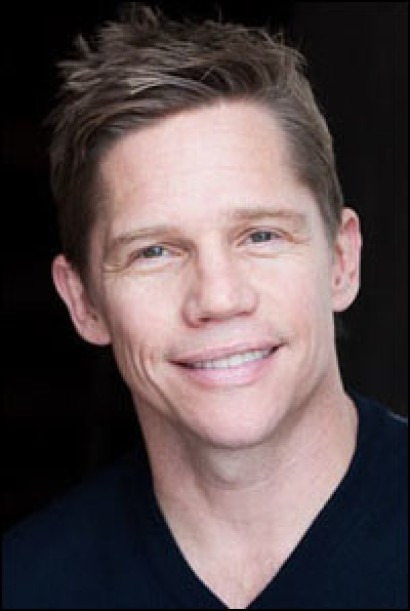
1969 – Jack Noseworthy Jr. is an American actor, whose most visible movie roles were in Event Horizon, U-571, Barb Wire and Killing Kennedy.
He was born in Lynn, Massachusetts, and graduated from Lynn English High School in 1982 and attended Boston Conservatory, where he earned a BFA.
He appeared in Bon Jovi's music video "Always", with Carla Gugino and Keri Russell. He co-starred with Meryl Streep in the Public Theater's 2006 production of Mother Courage and Her Children.
He starred in a short-lived MTV drama series, Dead at 21. In December 2005, he originated the role of Armand in the musical Lestat during its pre-Broadway run at the Curran Theatre in San Francisco, but left the production during its first week of previews. He is also the only male actor to play Peter Pan on Broadway, in the revue Jerome Robbins' Broadway.
Noseworthy made his debut as a nightclub performer in September 2006 at the Metropolitan Room in New York City in "You Don't Know Jack!".
In 2013, Noseworthy played Attorney General Robert F. Kennedy in Killing Kennedy, a made-for-television movie aired on National Geographic Channel.
In 2018, Noseworthy joined the Canadian production of Come from Away, in the role of Kevin T. and others.
Noseworthy has been in a relationship with Tony-winning choreographer Sergio Trujillo since 1990. They married in 2011. Noseworthy and Trujillo have a son born in 2018.

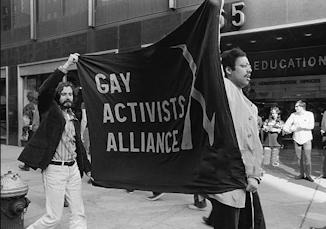
1969 – Gay Liberation Front members Jim Owles and Marty Robinson and about twelve people met in Arthur Bell’s Manhattan apartment and founded The Gay Activists Alliance (GAA). Author Arthur Evans wrote the group’s statement of purpose and much of its constitution. Acting on the principle that the personal is the political, GAA held homophobes who were in positions of authority personally accountable for the consequences of their public policies.
Accordingly, Robinson, Evans, and Owles developed the tactic of “zaps.” These were militant (but non-violent) face-to-face confrontations with outspoken homophobes in government, business, and the media. Evans was often arrested in such actions, participating in disruptions of local business offices, political headquarters, local TV shows, and the Metropolitan Opera.
In effect, GAA created a new model of gay activism, highly theatrical while also eminently practical and focused. It forced the media and the political establishment to take Gay concerns seriously as a struggle for justice. Previously the media treated Gay life as a peripheral freak show. The new Gay activism inspired Gay people to act unapologetically from a position of Gay Pride. This new model inspired other Gay groups across the county, eventually triggering revolutionary improvements in Gay life that continue to this day.
In November 1970, Robinson and Evans, along with Dick Leitsch of the Mattachine Society, appeared on the Dick Cavett Show. They were among the first openly Gay activists to be prominently featured as guests on a national TV program.

1988 – The Oregon Court of Appeals reverses two public indecency convictions of men looking for sex in restrooms, finding a right to sexual privacy even outside of enclosed stalls.

2007 – Nepal Supreme Court orders the end of anti-LGBTQ laws and creates new laws that safeguard LGBTQ people.

2009 – Mexico City legalises same-sex marriage and adoption by same-sex couples (effective March 2010)


14 notes
·
View notes
Photo

first half of 19th century Unknown artist, Thomas Lawrence - Sir Robert Peel, Bart
(Auckland Art Gallery Toi o Tāmaki)
77 notes
·
View notes
Text
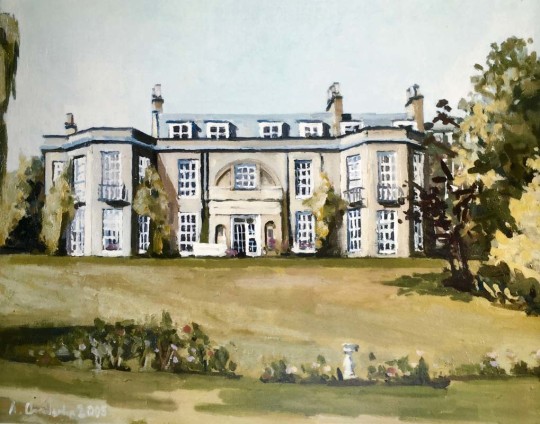
Harrow, A School-on-a-Hill:
The Park:
By the early nineteenth century, Harrow School had grown so much in importance, it dominated the town of Harrow-on-the-Hill, and the boys were allowed to use the grounds of a fourteenth century mansion (referred to at the time as Harrow Villa), for recreational purposes; its grounds having been landscaped and developed by Lancelot 'Capability' Brown in the mid-eighteenth century for its then owner, Lord Northwick, a governor of the School.
In 1831, the Rev William Phelps (an Harrow Master), bought Harrow Villa (then known as Harrow Park), as a boarding house for the School, and also bought it's walled garden and a substantial part of its surrounding grassy parkland.
From 1897 the House was renamed The Park, and during the twentieth century an extra storey was added and much of its grounds converted into the School's private golf course, with an area also set aside as a nature reserve. As such, there is no public access to Harrow Park. Instead, pupils and staff have exclusive access from the School's numerous properties along the park's west, north-west and north boundaries, from Football Lane, and also from a private path midway along Harrow Park Road.
Interestingly, a lion relief that was formerly above the east doorway now looks out onto the High Street from its present position above the Park's Reader. It was sculpted c. 1806 from Coade stone (an artificial stone, particularly resilient to cold and frost), ensuring the lion's features are preserved in perfect detail.
Park Lake (dating from Capability Brown's landscaping; now used for fishing by the Harrow School Angling Club), was made by building a substantial dam, and initially runs in the form of a narrow serpentine before widening near the north-east boundary of Harrow Park.
Famous Parkites include: King Hussein of Jordan (he and his brother, Prince El Hassan, later sent their sons to The Park); Edward Bulwer-Lytton (Viceroy of India); Viscount Ridley (British Home Secretary); Henry Yates Thompson (newspaper proprietor and manuscript collector); Sir Terence Rattigan (playwright); Pen Hadow (Polar explorer); Benedict Cumberbatch (actor); and the son of former British Prime Minister, Sir Robert Peel, who was also the first Harrovian to win the Victoria Cross.
Not familiar with Harrow jargon? The Reader is Harrow slang for the Library!
Always time for one more tradition: two John Glover paintings dating from the 1820s of Harrow-on-the-Hill as seen from Park Lake, are on display in The Park.
7 notes
·
View notes
Photo
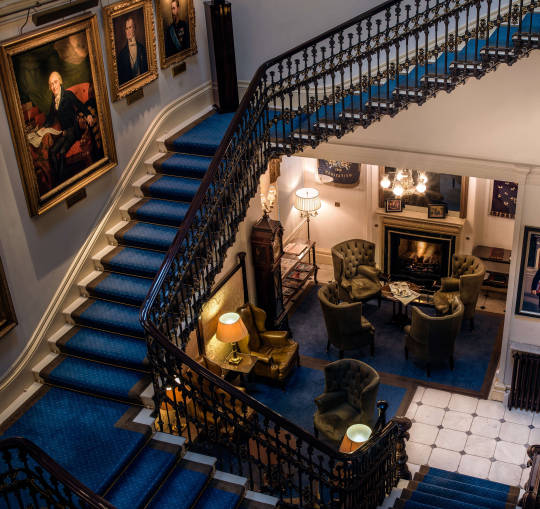
Never write a letter to your mistress and never join the Carlton Club.
- Arthur Wellesley, 1st Duke of Wellington
Despite its having Wellington’s characteristic terseness and, as regards the first bit, good sense, it feels an odd thing to say. Wellington was after all the Carlton’s founding father and, although he played no large part in its affairs, he must have observed its political success with considerable satisfaction. Perhaps, like many phrases supposedly uttered by famous people, it was attributed to him, but actually coined by someone else.
It would be hard to overestimate the importance of the establishment of the Carlton Club in the history of British party politics. At the beginning of the Nineteenth Century, there were in existence two great clubs, Brooks’s and White’s, linked to the historic Whig and Tory Parties respectively. But by the 1830s, the two political parties needed far more than their long-standing London bastions could supply. They simply were not large enough. Some MPs had begun to resort to non-political clubs, like Boodle’s in St James’s Street, giving rise to the following merry ditty: ‘In Parliament I fill my seat/With many other noodles/And lay my head in Jermyn Street/And sip my hock at Boodle’s’.
Such exile from the political mainstream soon became unnecessary. Politics entered a new era, in which the two parties, which evolved in the 1830s and the two subsequent decades - acquiring new names, Conservative and Liberal- expanded their political activities greatly. They needed London accommodation on a generous scale in premises which provided a variety of rooms, large and small.
That is what the Carlton Club supplied. In 1837, the year of Queen Victoria’s accession, it opened its first club house in Pall Mall on the corner of Carlton Gardens, yet another reminder of the gross, bloated monarch, George IV (114 years later a slim Miss Margaret Roberts would depart from the next door house in Carlton Gardens en route to her marriage to Mr Denis Thatcher).
The Carlton club remained on its Pall Mall corner site until a Nazi bomb fell on it in October 1940. The original club house underestimated the party’s need for space. It was enlarged in the 1840s as Sir Robert Peel brought the party first to election triumph in 1841, and then to political disaster and division as a result of the repeal of the Corn Laws in 1846. To assist the Conservative party’s recovery from the split that the Corn Laws’ repeal brought about, the enlarged building was demolished and replaced by an even bigger one in 1856.
Members stared from the Carlton club’s windows across Carlton Gardens at the Reform club, founded in 1836, four years after the Carlton, to equip the Tories’ opponents with the same range of services, social and political, that the Carlton pioneered. It should be noted in passing that in the new nineteenth-century political world the Conservatives put themselves at the forefront of organisational change, where they were to remain until Tony Blair’s day.
The close proximity of the two rival clubs meant that they kept each other under close observation. In the early days, the Reform took a great interest in the volume of mail posted by servants of the Carlton, who retaliated by waiting until darkness fell before venturing forth. During a political crisis in 1884, blinds were pulled down at every window of the Carlton club’s library after a member noticed two figures across the road in the Reform club spying with the aid of opera glasses. Members of the Carlton noted with satisfaction that their club eclipsed the Reform in size and grandeur.
But that’s a matter of griping. Or is that groping?
In 2022, the disgraced Conservative MP Christopher Pincher was alleged to have sexually groped two men, in an area known as Cads’ Corner within the Carlton. Former No 10 strategist Dominic Cummings once claimed that Prime Minister Boris Johnson referred to the now disgraced MP as “Pincher by name, pincher by nature” before making him deputy chief whip, which he subsequently had taken away from him.
The club boasts about this ‘inviting corner’ that features a small cluster of chairs underneath a grand staircase - but talk to my father’s peers and friends who are members about how Cads’ Corner gained its name and they get all coy and look at their watches. Indeed it’s well known that it’s the spot where male members could stand to stare up the skirts of female guests walking up and down the stairs.
As a member of the Reform club naturally I think they’ve got their head up their arse or at the very least looking up at some unlucky lady’s skirt.
#wellesley#duke of wellington#carlton club#club land#london#gentlemens club#society#St. James's#reform club#personal#scandal#poilitics#conservative party#tories#liberal party
31 notes
·
View notes
Text
Rules: List five comfort characters & tag five people
Tagged by @mygreatadventurehasbegun
I'm so excited! I've never been tagged for this type of thing before. I had to think a bit about what constitutes a comfort character, and I decided on these criteria:
Visual media only--if I add print, I'll get even more stuck in choice paralysis than I already am. But adaptations are allowed.
Something I've liked in multiple phases of my life--i.e., things I have a history with and still would go back to today.
Things I'd turn to for comfort after a bad day.
Things where the desire to do so is largely driven by getting to spend time with the characters.
So without further ado, here are my selections!
Emma Woodhouse (either the 1972 BBC version or the 1996 movie version)

2. Emma Peel
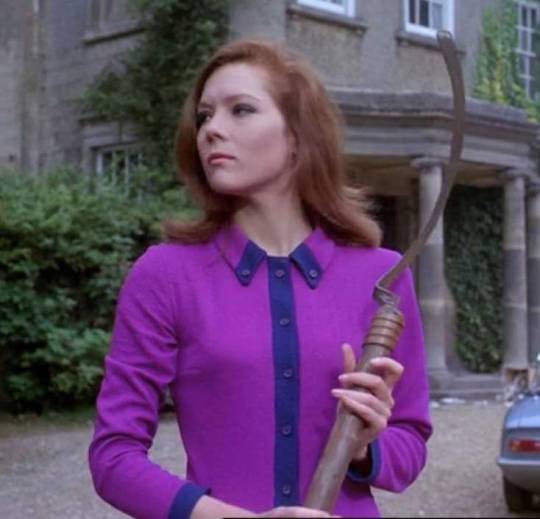
3. Any Fred Astaire character from a Fred-and-Ginger movie except Lucky Garnett of Swing Time. (Will also accept Jerry Halliday of Damsel in Distress or Robert Davis of You Were Never Lovelier.)
Here's Guy Holden of The Gay Divorcee as a representative.

4. Emperor Akbar and Empress Jodhaa

5. The family in My Neighbor Totoro

Honorable Mention:
Sir Percy Blakeney

Chihiro

Lili Schmidt
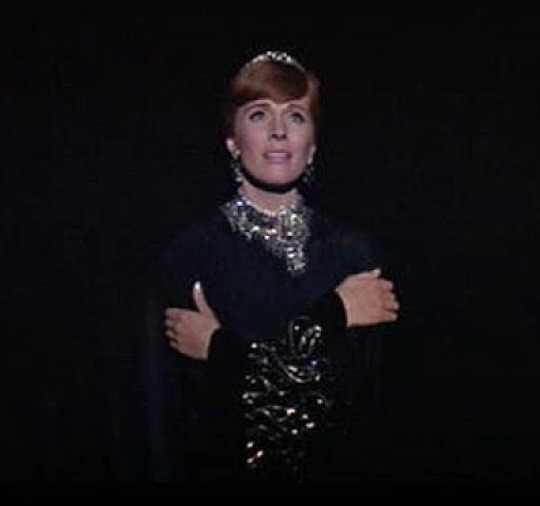
Tagging @cto10121, @anghraine, @northernmariette, @giuliettaluce, @sweet-christabel, @instantlyexhaustedowl, and @jchance4d4.
14 notes
·
View notes
Text
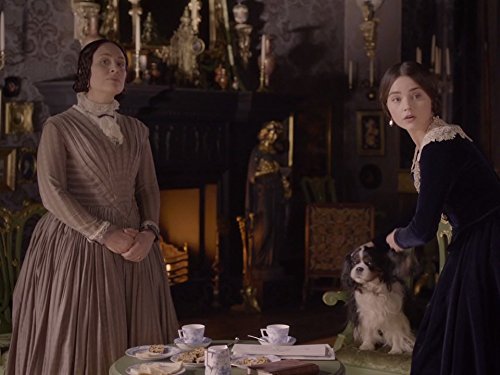
Victoria (2016) Warp and Weft
S2E3
The apprehension of a palace thief alerts Albert to household inefficiency, leading to pay increases for the staff, whilst Victoria receives a deputation from the weavers of Spitalfields protesting against foreign imports. Against the advice of Sir Robert Peel, who cites national unrest, Victoria decides to throw a ball where the costumes are only made by the Spitalfields craftsmen but Peel is proved right as the ball is seen as a costly extravagance whilst thousands are starving and there is a demonstration at the palace gates. The guests number Lord Melbourne, who masks his terminal illness from the queen, but Albert learns the truth and Victoria pays her former mentor an emotional visit.
#Victoria#tv series#2018 episode#S2E3#royals#costume ball#Spitalfields craftsmen#Lord Melbourne#demonstration#biography#period drama#history#Jenna Coleman#queen Victoria#just watched
2 notes
·
View notes
Text
Sunday 12 May 1839
7 50/..
12 10/..
fine but dull morning F48° inside and 54 ½° outside at 9 and breakfast in about ½ hour – then with A- (siding) in the store room till 11 ½ - then looking out books to be bound and looking into 1 or other till luncheon with A- sometime just before in the cellar choosing made wine for a poor man in a decline in one of Hannah Walkers’ cottage at Lidgate – after 3 other bottles, at last fixed on a pint bottle of good white currant – we had previously opened ginger, mixed currant (both said to be tartish – by A- and Oddy) and one cowslip of which I drunk 3 wine glasses at luncheon – then at my books again – till church time – there in about 20 minutes as usual – Mr. Horsfall did all the duty – preached about ½ hour from psalm (prayer book version) 92 vv. 1 and 2 – the church newly painted since last Sunday one looks clean and tidy but odd from the iron pillar supports of the gallery and the chain of the great brass chandelier the curtain rod of the church warder’s pew (the curtain rod) being painted a light blue – the taste of the church warder, Mr. Henry Flather, a very good sort of man of blue (a conservative) politics – a few minutes at the school where A- wrote a few lines in pencil to Mr. S. Washington (George took the note while we were at Cliff hill) to desire him to stake out the 1200 yards of stone for each of the Messrs. Hemingway as soon as he could – tomorrow Tuesday at latest Wednesday as A- wished to see the staking out before writing to Mrs. Sutherland – 21 minutes at Cliff hill – Mrs. AW. well as when I last saw her, and in good spirits – home at 5 20/.. by our late clock – A- and I walked down to the meer and back and then a little in front of the house for 35 minutes – I staid out 10 minutes longer and came in just before 6 – then wrote all but the first 1 ½ line of today till nearly 6 ½ - then read a few of the first page of Wilkinsons’ Topography of Egypt and Thebes – out of print – cannot get it – dinner about 6 50/.. A- read aloud the leading article of the London newspaper (morning Herald) – Lord Melbourne prime minster again! – the queen refused to let Sir Robert Peel appoint the officers of her household Ladies of the bedchamber etc. etc. and .:. Sir Robert declined forming a ministry – very right – the Herald thinks Sir Robert cannot be kept out of office a month – Letter from Marian Mill cottage Northcave hurried – about 1 ½ p. – she will be here on Tuesday night, or, if not, on Wednesday – coffee – came upstairs before 9 struck and wrote the last 7 lines – read a few pages at the end of topography of E- and Thebes – then somehow or other sleepy and then incurred a cross sitting on my chair till very near ten thinking of π- then in the tower study arranging my books till near 11 at which hour F49° inside and 42 ½° outside – fine day
2 notes
·
View notes
Text
Robert of Iron: hope you like no stealing
This one isn't as long as the last, but I hope you all like it. Sorry about the steal bit, I am distrusting of the internet.
Made for the 'Old Knight' writing prompt for the DnD thing, I know it's early, but I'm impatient.
Sleepy, this isn't the story idea, it was just a short story I finished today, hope you like regardless.
An old man sat in a great leather chair in a cold room, the plain stone walls surrounding him covered with furs, linen tapestries and a grand assortment of beautiful weaponry that had never once been used for their purpose. He was a man of rather diminutive stature, as he had been his whole life allotted only with a mere 5’ 5” of height. Yet, he was in no way lacking of presence.
His chest was broad, with shoulders to match, dressed in a great fur cloak, pinned together with iron badges, worn as if they were gold. His stomach was flat, toned from a past he disliked, his legs dressed in silver linens and his feet in fine leather boots. Finally his face was squarish, his chin and neck covered by the shadows of silver bristles that he had left untended, unbothered. His nose was large on his face, a scar decorating it as it streaked diagonally across it, an unmanaged bramble of a moustache stuffed underneath it. His hair was as silver as everything else, but was flecked by the odd black hair that had resisted the invasion of time that had beset the man: it was trimmed short, barely an inch in length, standing at attention in various directions like a silver hedgehog.
He looked out over a dying fire in front of him, his eyes amber affairs specked with gold, like sparks from a fire, but now dulled with age, stuffed under a pair of thick eyebrows.
The latch of the door behind him clattered about, the door being peeled open slightly as a young woman peered past it’s edge into the room. “Sir?” the woman let out into the room, looking at the back of the red leather chair she knew her master sat in. “Sir Robert?”
“What?!” Robert snapped out, his gruff voice rumbling through the room like thunder, making the young woman wince as she shuffled further into the room, shutting the door behind her.
“T-there’s a message for you from sir Helmuth.” The young woman stammered out, her young voice quavering, still looking at the back of her masters chair.
“Well? What did it say then?” The voice called out from behind the chair, punctuated by the sudden snap of a log on the fire.
“Sir, I think this was only meant for yo-”
“I know bloody well that you’ve already read it, so spit it out!”
“Of course sir,” the woman replied, rushing to pull open the well re-sealed message not daring to risk getting a detail wrong, quickly pouring herself over it to refresh her memory. The young woman cleared her throat, clicking her armoured heels from reflex, “He wishes to know if you would be willing to reconsider your decision not to return to the knights.”
The woman looked over to her master, hearing the chair shift from his movements. “Then you shall tell him that neither I nor God himself would be willing. I stayed longer that I was told I should have to, so I shall not be easily dragged back.”
“The First knight, Sir Helmuth also wrote, that,” the woman grunted slightly, fingering the collar of her breastplate, “if you refuse this summons… You will be executed on grounds of treason,” The young woman was silent for a moment, a silence matched by her master, “it has the royal seal, it’s no bluff Sir.”
Silence thundered throughout the room, crushing everything in it, her armour no more effective than tin to it’s assault. Suddenly Robert leapt from his chair, the massive leather beast rocking on it’s feet from the force. He whirled around, his cloak billowing about behind him like a storm cloud as he strode forward his steps echoing out like thunder. The woman tried to duck out away from the man she outstood by a foot, looking after him with a boiling mixture of curiosity and terror. Far more for the fate of the First knight that that of her master.
She rushed after him, always only able to catch a sight of his billowing cloak as he marched through the twisting corridors of his manor. She had always loathed the feeling of being outpaced by a man older than her father, especially considering the former had fewer toes on his feet than he ought to. As she whipped her head around a corner into a long hall she realized she had lost sight of him, feeling a cold sweat dowse her brow out of worry of what he could be doing out of her sight.
Then from a room just ahead of her, in the middle of the hall, she heard the sound of rummaging and clinking steel along with an assortment of curses that tumbled through the door. She walked over to the door in question, it was for the storeroom. One of four in the house. She peered past the doorframe into the room to see her master, pulling chainmail over himself, his old armour laid out before him on top of his removed cloak.
“Sir Robert, what are you doing?” She asked, trying and failing to disguise the worry in her voice. He looked over to her, his expression a snarl somewhere between fury and melancholy.
“I am going,” he responded harshly, gritting his teeth as he pulled on his gauntlets, pulling the clasps taught.
“Going where Sir?” she asked, her eyes darting about the assortment of weaponry laid about the room between beautifully bound books, rolled tapestries and various trinkets and fineries.
“To that bastards summons, and drop the ‘sir’ nonsense,” he grumbled out as he pulled the bottoms of his armour toward him.
“Pardon?” She replied surprised, leaning down slightly as she took a step closer.
“Bloody fool,” Rober muttered to himself, making it clear he had ignored her, “summoning me back. When a man gives you his words that he’s done, I should not expect it to ever begin again! Calling me back for some bloody stupid thing as this!” He grumbled out as he pulled on his armours, hopping on one unbooted foot as he did the other. The woman looked at her master with exasperation, her nerves slowly uncoiling from the knots they had been twisted into. “You,” Robert suddenly snapped out, making her snap to attention again, “go tell one of the porters to pack things, tell him it’s for Spring trip, he’ll get it.” He ordered out, his voice quite clear.
“Yes sir!” she responded, giving him a salute as she began to turn away.
“And pack for yourself as well, your coming with me, along with that boy Erica.” She froze at this, turning back to her master with a shocked expression on her face.
“Huh?” Robert looked at her with a stern expression, making it clear he was not joking. “Sir, I beg your pardon, but why do you need me, I’m sure that-”
“Did I ask for protests, Orin?” He rumbled out, fixing his other gauntlet onto his hand. Orin looked back at him nervously, then gave a jerky nod and dashed off to her duties, staring down at her feet as she did so, an expression of terror etched into her face. She found Erica first, in the training room next to a punching bag suspended from the ceiling, pummelling it with his fists.
Erica, despite the name, was a young man of about twenty, a few years Orin’s junior. He was about the same height as her, and about the same build, though with smaller hips and longer legs. His arms were covered in tattoos, shouting out the various names of gangs he had been pulled into when he was younger by his brother, near a dozen in all, along with various flowers. They were rather thin, never manging to bulk up like her or their master, his strength still quite formidable despite appearances. As she walked through the door, he looked over to her, a sour expression on his face, one that always seemed to hang from it. His face was freckled and apple cheeked, never managing to grow facial hair despite his attempts, a spattering of freckles coming across his nose and cheeks a pair of blue eyes turned to her with a pissy look below a mess of straw gold hair.
“Erica, pack your stuff, we’re accompanying Robert to Vessal, meet us down by the carriages in a bit.” She barked out, looking at him with a bored look.
“It’s Eric,” he snapped back, flexing his hands as he pulled away from the punching bag to got over to his belongings.
“No, your mother gave you the name Erica, I’m quite sure of it.” Orin retorted smarmily, a sly grin pulled across her face as she walked away chuckling to herself as Erica, um, ‘Eric’ grumbled to himself about how his mother wanted daughters and other things.
She found a porter next and when she relayed to him what Robert had said, he stiffened slightly then gave a snap of a nod, his face drawn tight. She watched him go for a second before gong off to pack her own things.
Eric and Orin were the first by the carriage, the porter, a young elf man, well as young as an elf can be, loading up the carriage. The two young knights were bickering with each other, Eric with a sour look on his face as he looked up at the sly face of Orin, the latter dodging a punch from Eric near effortlessly.
Robert came in just as the carriage was loaded up, dressed fully in his armour, a rather plain piece for a knight of his station, but, that was more recognizable than anything he could wear really. The two young knights stopped their play fighting, snapping round to look at their master then snapping to attention. Robert looked at them boredly for a moment, then rolled his eyes with a sigh as he repositioned his helmet held in the crook of his arm.
“Get in you bloody fools,” he rocked out, striding past them towards the carriage as the porter hopped up into the drivers seat of the carriage, pulling on a slightly crumpled red cap and a pair of gloves.
“Yes sir!” they barked back, still looking forward as he passed them. They then turned and followed after him, much more nonchalantly. Orin giving a light shove to Eric, which he tried to retaliate to, but missed, stumbling slightly as she laughed at him, hopping into the carriage.
They left with the click of the carriage door and the snap of the reigns that sent the great horses forwards, quickly launching themselves forward. They raced down the winding path that led down from Roberts manor, darting around the chicanes formed by the thick forests that surrounded it. It darted past the ancient firs, pines and all else, like a racing chariot from the capital. The great marble grey horses, with their dark grey manes and thick fetlocks darted like racers, the carriage following on after. The driver fancied himself a racer, well, more than fancied, often taking his masters horses out for impromptu races even with the cart. He thought he had hidden these little trips from Robert.
He hadn’t.
But Robert didn’t mind. He preferred the pace, as did his apprentices who looked as if they were on a carnival ride rather than a carriage. Roberts’ home, and that of his three companions, was dug in the middle of a thick forests in the middle of nowhere, a good few miles from the capital and from where any other knight or soldiers lived. He enjoyed his solitude. He despaired at comrades and subordinates, a fact that often made other surprised at Orin and Eric (they did not present the best example of first class knights after all). But, his chief irritant had always been his superiors.
They made it to the capital near the middle of the second day, the great city seeming to drip down from the horizon like a black tear. Vessal was a walled city, the accompanying slums stuck to the sides of those once great white walls like barnacles on the stomach of a white whale. The houses of the city pulled themselves high off the ground like sunflowers reaching up for the sun, leaving many streets in their shadow, lit by candles or braziers. People danced and sang through the cobbled streets.
Many different races mingled in the streets as they went past. A trio of dwarves shouting out, already day drinking as they watched the day hop over the crest of midday, accompanied by an elf who, despite having a large empty mug in one hand seemed the most sober of them all, dressed in furs with a wispy beard. A goblin woman called out slogans in front of a pub, getting the odd glance from passers by every third one being one of disapproval for any sort of assumed transgression the girl had made.
As they continued up through the city they saw various exchanges, the controlled chaotic routines of the city. But, they also saw the early marks of the brewing conflict on the cities face. The rush of customers through food shops as those in the know or of an unsettled disposition stocked up. The closing of blacksmiths, alchemists and weapon merchants as they were pulled under the umbrella of early orders. The flighty and suspicious glances of guards upon anything or anyone that gave the air of being foreign or new to them.
They reached their destination at last and alighted from the carriage, the driver going off on his own to the stables. The Standard Building looked quite contrary to what it’s name suggested. It was a great square building, built straight and precisely, almost impossibly so. Dressed in white stone and black wood, narrow windows stuffed with stained glass held behind steel bars. It was the head office of the army. Placed exactly where the king had raised his standard for the last war.
Both Orin and Eric looked up at it with wonder. Robert however, regarded the building as a prisoner might his cell.
Robert strode forward to the door, the other two starting after him, snapped out of their gawking. He flung open the door, diving past the threshold into the building. A thin man sat behind a podium of a desk jumped as Robert entered, attempting to stammer out protests at the sudden entry but failed to force the words past his traitor of a tongue before the trio advanced into the next room, Orin and Eric calling back half hearted apologies, great smiles on their faces.
They stormed through the rooms of the building, various off duty guards or clerks snapping their heads round at them as they went, all wearing the same flabbergasted expression. A few guards moved to intercept Robert, but either they recognised him, or just had a sudden burst of common sense, making them practically jump out of his way, looking at him with either reverence, or more often brick shitting terror. Orin and Eric offered sly hellos and waves, being regarded as great oddities to be in the company of the first man.
Robert seemed to fly up the stairs, his footsteps thumping like a stonk of cannon fire on the wood steps. Then he reached the door of his cell and threw it open with an idle hand, the thing nearly being pulled from it’s hinges in the process.
His entry caught the rooms attention as he lingered in the entrance, levelling a dull glare through the room. Looking for his mark.
“Well, Robert, you finally arrive!” There he was. Helmuth was a significantly taller man than Robert, about an inch taller than Orin, but built far more like Robert, though with a more noticeable gut he hid behind his breastplate that could be attributed to the viaduct of bear that made it’s way down his throat. He had a long squarish face, his chin wrapped in a small blonde scrap of a beard. He always wore a slight smile, under a large nose and a pair of brown eyes. His hair hanged down in a foppish fringe above his brow that he constantly had to hod back as he dropped on his helmet. He seemed a good man, to any outside observer. Someone else’s boss often does
“Well, it took a while to buff the ashes of the last war off my armour. You know, the one you said would end all others.” Robert rolled back, thumping into the room, followed by his two companions who looked over at the dozen or so young knights lined up on the other side of the room from Helmuth. They looked over at the trio, expressions ranging from shock to outrage, a pair dressed in their fear, Orin and Eric gave them a wave, not improving the looks on any of their faces.
Helmuth sighed, clicking his tongue, shaking his head slightly. “Now don’t give me that.” He returned: his exasperation clear in his voice. Robert stormed closer to him.
“No, I think I will bloody give you it!” he roared out, his voice tremoring around the room like rifle fire. “You said we were done. That I was done, you promised, they promised, you all laid hand on heart and told me that!” Jabbing his finger at him as he spat out his retort, punctuating every word.
“There’s the threat of an invasion, there’s nothing we could do.” Helmuth droned out, having expected this, though foolishly hoped that he wouldn’t have to.
“Yes their bloody is, you could just let them have the bloody land they want.” Robert barked back, a mixed look of exhaustion and anger piled onto his face. Helmuth shot a look around to him at that, and a few of the young knights sent shocked looks over as well, not that the latter seemed to matter to either man at that time.
“We can’t flog of land to preserve the peace!”
“Why not? No one lives there, nothing of any value is there. The only thing it has to offer is the same patriotic pride a farmer gets when his horses are bigger than his rivals.” Robert retorted, a look of exasperation his face as he growled it out. “It’s not worth the life of even a single man.”
“Robert-” Helmuth began, but Robert cut him off.
“No, I have lost more good friends and good men than I can count on all my fingers and toes. A fact made worse by the face that many of them got blown off in the war!” Robert roared back, jabbing his hand towards Helmuth, the left appendage missing the ring, pinkie and half of the middle finger. “You said we were done,” coming close to the man, “so I’m fucking done.” He rumbled out, jabbing the taller man in the chest.
Two of the young knights were on him then, snapping up either side of him, the tips of their swords almost lapping at his neck. Helmuth looked down at him with a pleased expression for a second before he noticed a pair of swords by his neck as well. Orin and Eric stood either side of him, their faces serious for the first time since they came in, a look that matched the bored ferocity of their master.
“You know that you’ll already be skewered before these two can do anything to me Robert.” Helmuth put out plainly, keeping his head quite still.
“I’ll be fine.” Robert responded, quite calmly, looking up at him with eyes that told him the same. Helmuth looked down at him for a few long moments, before he sighed and raised a hand, making his subordinated back off with confused looks. Orin and Eric pulled back slowly, their faces quite serious as they walked over to Robert, standing just behind him.
“Go then.” One of the younger knights piped up, pushing past his fellows, his face the textbook example of snobbery. He was tall and lithe in figure, who almost seemed to glide forward like a new warship. Both the older men and the seconds companions turned to look at him. Helmuth with a confused look, the other three quite dismissively. “Run off, we are quite enough to win this war, we don’t’ need to drag your old bones with us. You can leave this glorious war to use if you’re such a coward.” The young man declared, his speak drowning in his own pride.
“Glorious? You think war is glorious?” Robert asked, scoffing, the other three by him shooting him a look, knowing what was next.
“Of course, there is nothing more so.” He replied, studying his fingers as he looked over idly.
“And who told you that?” Robert asked, a slight smile appearing on his face for a moment.
“My father.”
“Has he ever fought one.” Robert responded darkly, surprising the younger man somewhat.
“Well, no but-”
“Then why would he ever be right.” Robert growled out, his voice guttural like a lions. He fixed the young man in a glare that put him far below anything else in the room. The younger man looked to Helmuth for agreement, but found the man giving him a look that read the same as Roberts’. The whole room shook at that, the pressure of their eyes weighing on them like mountains. Robert looked over to Helmuth.
“You said we were done with that hell,” Robert said, sombrely Helmuth looking down at him a flare of sympathy in his face, “now, not only are you letting us be dragged back into it, you’re leaping headfirst into it.” Helmuth looked down, not meeting Roberts’ eye as he tried to hide the look of shame on his face. Robert looked down on him for a long silent moment before turning around and marching over to the door, not one man moving to stop him.
“If this happens, send your armies to me,” Robert called back, making Helmuth turn up to look at him, “I shall wield them well, and break our enemies with a rod of Iron.” Helmuth looked up with an expression of joy, opening his mouth to say something. “But, if this happens, if you are so big a fool, to not simply hold onto peace, no matter the difficulties. Never again show your face around me again.” He rumbled out, making the taller man stiffen, looking up him in fear and in shame.
Robert marched forward, a glowering expression pulled across his face. As he left both Orin and Eric waved to the other young knights and to Helmuth. Many of the former strewn on the floor, having collapsed from shock. After they left one of the younger knights stammered out a question.
“W-who was that?!” Looking at the door.
“Robert of Iron,” Helmuth responded, as much to himself as to the young knight, “the greatest, strongest and most terrifying knight any of you will ever meet in all of your lives.” Helmuth looked at the door, but seemed not to see it, looking off at some far gone thing not even he knew about. “Someone who has far more sense than I or anyone else.” Helmuth added as he walked over to a window that over looked the street below, the rumblings of the war he would not stop echoing louder and lounder in his mind accompanied by the memories of the screaming chaos and righteous ruin that he had lived through and he knew he would bring again from his weakness.
He seemed a good man. He wished he was the man he seemed to be. But, he had not will nor body of iron. War would come, and all would be broken with the Iron rod of war.
“I’m sorry Robert, truly.”
@agarespicero @gaap-goemon-ismylife @psycho-zom-atic @shaoron @jemimacatclover @irumeanie @sleepy-gry @pemopemochimi @csoisoi @chaosunit0010
#writblr#writing#writeblr#writers on tumblr#Robert of Iron#Orin 'Cheshire' Chester#Erica 'Eric' Vale#Helmuth Horrace-Hever#HMAD#dndtoberchaos#dndtober#fiction#dnd#dnd stuff
7 notes
·
View notes
Text

TIL that Sir Robert Peel got the nickname "Orange Peel" because of his stance on catholic emancipation
#Robert Peel#why are the Brits so goddamn funny#ik orange bc Whigs and William of orange but that doesn't make the fact that they called someone orange peel any less funny
4 notes
·
View notes
Text
“...Tensions between landed and commercial wealth had existed in Britain for centuries before Austen’s day, often expressed as a conflict between the Country and the City, with the aristocracy and the upper flights of society generally associated with the country. London’s astonishing growth was often resented even as it acted as a magnet for people – especially young people – of all classes. But while sharp contrasts made for good arguments and animated many plays and novels, the reality was usually more muddled and human.
Throughout the sixteenth and seventeenth centuries younger sons of good families had often sought to make a fortune in trade of one kind or another. It was not uncommon for the younger son of a prosperous country gentleman to be apprenticed to a mercer, a draper or even a cheesemonger, either in a nearby town or in London if the family already had connections there. This gradually became less popular over the course of the eighteenth century as opportunities in the gentlemanly professions became more numerous and better rewarded.
Some forms of trade were considered hardly acceptable for gentlemen: anything requiring manual skill, retail trade and small businesses were death to social pretension. The notion of a publisher, a bookseller or a goldsmith aspiring to be treated as a gentleman was challenging if not ridiculous, and they were probably the most acceptable of such occupations. But bankers and merchants who traded on a large scale, especially overseas, had a much greater social standing, especially if they were rich and had the manners of a gentleman. Lord Chesterfield, of all people, thought ‘Trade’ the equal of the more obvious careers for the son of a gentleman, recommending it for ‘an acute, thinking and laborious [that is, hardworking]’ boy.
One indication of the social standing of merchants, bankers and other prominent businessmen is the significant number who were elected to Parliament in this period: no fewer than 360 out of the 2,143 MPs between 1790 and 1820. Almost half of these were bankers, although many of them had other commercial interests as well. There were 35 MPs engaged in the trade with the West Indies (including, up until 1807, the slave trade); 25 who traded with the East Indies; 10 who traded with the USA and Canada; 10 wine merchants who imported wine mostly from Portugal; and a dozen MPs who were primarily ship owners. Thirteen MPs were or had been directors of the Bank of England, and 32 were or had been directors of the East India Company.
About 50 MPs were engaged in manufacturing or industrial concerns (including Sir Robert Peel, the father of the future Prime Minister); 30 derived a significant part of their income from coal mining; and 25 were brewers or distillers. Rather more than half of all these MPs were based in London, but others came from across the whole country, and they included both Irish and Scottish bankers. Most had made their own fortune, but there was a significant number who were the second, third or even fourth generation in their bank or business. And all these men, simply by being a Member of Parliament, had a strong claim to be regarded as gentlemen, unless they were exceptionally vulgar.
…Bankers and merchants came from a wide variety of backgrounds. The most socially assured usually belonged to the second or third generation: brought up in affluence and given at least part of a gentleman’s education, but also knowing that they were expected to take their place in the firm. Men like Sir Peter Pole, Alexander Baring and Henry Thornton had one foot in the City and the other in Westminster and Mayfair. There were also a surprising number of Englishmen who had gone out to India as young men, made a fortune often while still young, and come home as wealthy nabobs who then invested their money as a partner in a bank.
Given that they were already rich, they were unlikely to have been motivated primarily by financial gain, but by investing in a bank they gained a position in the social and commercial world that, as virtual strangers after years abroad, they might otherwise have struggled to find. It is also possible that they took to banking to keep boredom at bay: years of hard work in India was poor preparation for a life of idleness in England, and they were men who were confident of their ability in dealing with finance and business. No fewer than 13 such nabobs-turned-bankers took a further step and went into Parliament in the 30 years between 1790 and 1820.
…Success enabled bankers and merchants to become gentlemen, and gentlemen could also become bankers and merchants. The most obvious way was for a father to entrust one of his younger sons to his brother, brother-in-law or close friend who was already engaged in banking or trade. Such connections were not uncommon: Mr Bennet had Mr Gardiner, and, as we have seen, Henry Hickey was sent to Dublin to be trained in the business by an old friend of his father. Without such personal connections it was much harder for the father of a young man to find him a place in the commercial world, for there was no recognized career path as in the navy or the Church, but examples do exist, such as the two boys from County Durham whose parents each paid more than £600 to apprentice them to a London banker in 1755 after they had finished their time at Eton.
…Most merchants conducted their business with only a small staff, and banks were not much larger: Glyns, of the larger banks, had only 36 staff in 1815. Several of the insurance companies, the East India Company and above all the Bank of England were the most notable exceptions, with the Bank’s staff tripling over the course of the war to a gargantuan total of some nine hundred clerks in 1813. It was the only bank whose stock could be owned by the public: all the others were private banks, with a maximum of six partners. It was easy to obtain a banking licence (renewable annually for £30 in 1815), which imposed no minimum capital requirement or proof of creditworthiness, but which allowed the holder to issue their own banknotes. (It was up to the public to decide whether or not to accept them, just as it was up to the public to decide whether or not to trust the bank with its deposits.)
Small banks proliferated across the country: by 1800 there were 386 country banks; nine years later the total had reached 800. Evidently the opinion of a character in Austen’s Lady Susan that ‘when a Man has once got his name in a Banking House he rolls in money’ was popular, but even in these relatively prosperous years there were numerous failures as well as successes among the banks. Country banks each had a connection with a bank in London which acted as their agent and would accept their bills, and these ties were sometimes reinforced when the sons of country bankers worked for a time in the London bank, even becoming a junior partner or marrying into the family.
The leading London banks often specialized in one way or another. Coutts was the banker to royalty, high society and many leading politicians; Praed & Co. had strong contacts in the West Country and Cornwall; Child’s had many Indian connections; Drummonds looked after army agents; Wright’s was the banker of choice to the Catholic gentry; Herries assisted young men embarking on their Grand Tour; and Barings was deeply involved in foreign trade with loans to merchants and overseas governments. Across the country many Quakers were involved in banking, including in Lloyd’s in Birmingham, Backhouse in Darlington and the Gurney family in Norwich.
The Gurneys had close connections with the London firm of Overend, Gurney & Co. who were, for more than a generation, the largest bill discounter in the world, a banker’s bank, who preserved many essentially sound businesses during the financial panic of 1825. The standing and creditworthiness of any bank or merchant house were highly dependent on the character and reputation of its principals, and the success of any bank or bill discounter depended on judging when and to whom it was safe to extend credit, and when and to whom such accommodation should be refused.
Each clerk at Glyn, Mills & Co. had to provide a fidelity bond of no less than £1,000 as security in case he should ‘lose, embezzle, purloin, consume, misspend or unlawfully make away with, detain or keep any Money, Bond or Bonds, Bill or Bills, Note or Notes, Paper or Papers, Goods, Chattels, Effects or other Thing or Things whatsoever . . . or make any false or fraudulent Entry or Entries in any Book or Books of Account . . .’. Most of the clerks employed at Glyns between 1810 and 1840 regarded themselves as the sons of ‘gentlemen’, while others cited fathers who were farmers, surgeons, merchants and brokers.
About one third came from London, the rest from all over the country. They were engaged when they were between the ages of 18 and 20, but usually put their names down a couple of years before, for there was a waiting list. Once they were engaged they served on probation for the first three months. Junior clerks lived on the premises, with one partner also always in residence. Most of the rest of the staff lived nearby. The working day began at nine o’clock, with the bank closing its doors at four o’clock, but the need to complete and balance the accounts meant that senior staff often did not get away until almost six o’clock and juniors even later.
Saturday was a normal working day, and the clerks received one month’s paid holiday – every four years. A fully qualified junior clerk received £70 a year until 1815 when it was increased to £75, and this pay was usually increased at a rate of £5 a year until it reached £100 with further increases depending on merit and responsibility. Senior clerks might earn £200 to £250, with heads of department getting £400, and all these figures would be significantly increased by a Christmas bonus paid for by the bank’s customers (including the country banks). However, it was becoming rarer for a clerk, however senior, to leap the chasm and become a junior partner.
There were many worse jobs in early nineteenth-century England than working as a bank clerk, but it was an occupation with few prospects. Life for the partners, at least in good times, was much less exacting. One partner was usually expected to reside at the bank or very close to it at any time, and this duty usually rotated unevenly, with senior partners spending as much time as they wished in the country. (Indeed, some senior partners, such as Sir Peter Pole, never played an active part in the business of the bank, their contribution being limited to their capital and the value of their name.)
The partner in residence might need to take considerable responsibility when sudden demands were made upon the bank, but the most important decisions could usually be referred to one of the senior partners. The outbreak of war in 1793 was followed by a general tightening of credit and the partners at Hoare’s Bank in Fleet Street, along with many others, decided to be cautious in granting new loans and pressing in their requests for the repayment of old ones.
Soon customers such as the Earl of Thanet were receiving polite letters stating that ‘We wish you in every respect to consult your own Convenience as to the time of replacing the Money overdrawn on your Account’, or even – to the agent of Lord Rivers – ‘we are extremely concerned that it will not be in our Power to advance the sum Lord Rivers requires’. This risked alienating old customers, but it also helped the bank’s reputation for caution and stability, and, at least in this case, probably did more good than harm. Nonetheless such decisions could not have been taken lightly, and there were times when being the partner in a bank was the source of considerable anxiety.”
- Rory Muir, “Banking and Commerce.” in Gentlemen of Uncertain Fortune: How Younger Sons Made Their Way in Jane Austen's England
3 notes
·
View notes